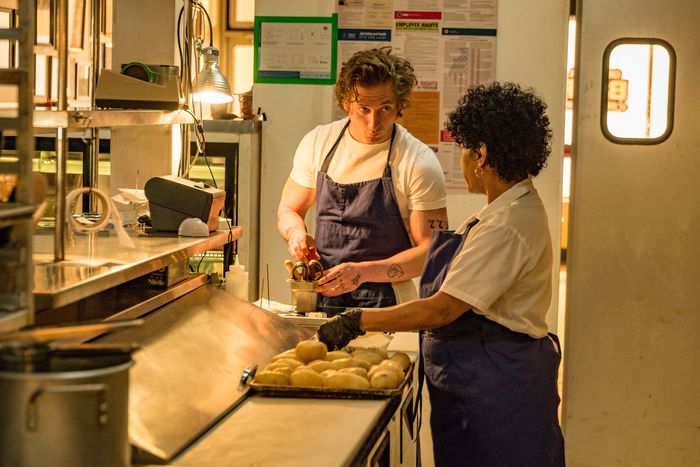
The business and artistic benefits of the “all episodes available at once” arrangement have been debated ever since Netflix gave us the opportunity to gorge ourselves on the onetime pleasure of Kevin Spacey talking directly at you. But really, there are no rules. At a time when religious observation is at a historic low, streaming allows you to play God. So, Gods, may I offer you the option of starting FX on Hulu’s The Bear with its finale if you’d like to watch the series definitively as a comedy.
I did this by accident. (If you are reading this, FX PR, please order your screeners in ascending, not descending, order.) A finale makes for a very weird pilot, but there is an introductory quality to a monologue a lead character gives in its opening moments and essential exposition in a conversation another lead character has about their background in food. Then, at the very end, something happens that I will not spoil. Just know what was apparently the cliffhanger for season two plays like an inciting incident for a television series. Again, I won’t spoil what happens, but from now on I will be discussing how the ending makes the viewer feel and how that influences the show. If you don’t want any more information, please stop reading right now. LAST WARNING.
Knowing for certain that things work out for this ragtag group of Original Beef of Chicagoland employees radically changes how the series plays from the top. The pilot drops you in on the restaurant’s chaos, with everyone being disrespectful if not downright hostile toward each other. Everything is a mess. The beef shipment is late and wrong. People are screaming “Behind!” “Corner!” “Hands!” “Fire!” There is, literally, fire and so much bubbling, scalding liquid. The cuts are fast and sharp. Ironically, the knives are dull and they’re everywhere. The opening riff of Refused’s “New Noise” is playing. It’s like if Uncut Gems was set entirely in the trunk of Howard’s car. Many of my co-workers found these early episodes stressful. Some considered quitting the show if it weren’t for the effusiveness of those of us who kept with it. I found it fun. I found it funny.
There is a comedy theory called “benign violation” that suggests that for someone to find a joke funny, it needs to violate some sort of expectation, belief, or taboo, and that violation has to be perceived as not threatening. Watching the finale first makes The Bear’s opening episodes feel less threatening. In the pilot, Carmy (played by a simmering, inward Jeremy Allen White), the former chef de cuisine of the best restaurant in the country, has returned to run his deceased brother’s Chicago Italian beef shop. The deceased brother’s best friend and employee, Richie (played by Ebon Moss-Bachrach, giving one the best, most natural performances on TV), hates everything about the world changing around him and calls Carmy “Bobby Flay” in response to his attempts to change the Beef’s operating “system.” There’s no break in the music or a reaction shot, nothing to suggest this is a joke. Just a frantic close-up of Carmy dicing celery as he says, “Don’t call me Bobby Flay.” I laughed out loud. I know how perfectly insulting it is for a chef with Carmy’s pedigree to be compared to TV’s most famous squirt-bottle-sauce dispenser, but I also know the context of Carmy and Richie’s relationship, and more importantly, where it ends up. Violation plus benign.
For days over Slack, Vulture employees have been debating whether The Bear is a comedy or a drama, a comedic drama or a dramatic comedy, or potentially post-comedy. The show itself doesn’t offer easy answers in its first season until arguably the last five minutes of the finale. It is a comedic ending in an almost Shakespearian sense, as two characters embark on a professional marriage of sorts. These last five minutes also provide information that fully changes the pilot. Crucially, at the very end of the first episode, Carmy does not do something that would’ve changed everything for the character and the restaurant. It would prevent all the conflict and most of the heartache that takes place for most of the season. It’s one small thing and he is right there. Knowing what I know, it plays as a hilarious irony. So much so that if you decide to watch the series in chronological order, I suggest you go back and watch the last five to ten minutes of the pilot after completing the finale. I promise you will find it funny. (Or watch the whole season again: You’ll notice they’ve peppered allusions to the end throughout.)
Whether my co-workers found The Bear funny or stressful, all agreed they liked the show. They thought it was good and it made them hungry. Like, literally hungry for food. And hungry for more episodes or to rewatch the episodes they’ve already seen. Yes, there is the creator’s vision of how the story should unfold, but it speaks to the series’ episodic craftsmanship that you can watch any installment at any point and feel like you’re getting a better understanding of the characters and their world. So, as of today, you will have all the episodes in front of you. It will not be unlike when you order delivery and what was once an appetizer, entrée, and dessert are now all presented at the same time. You can eat the dessert first if you think it will make the whole meal sweeter. It’s your binge.





